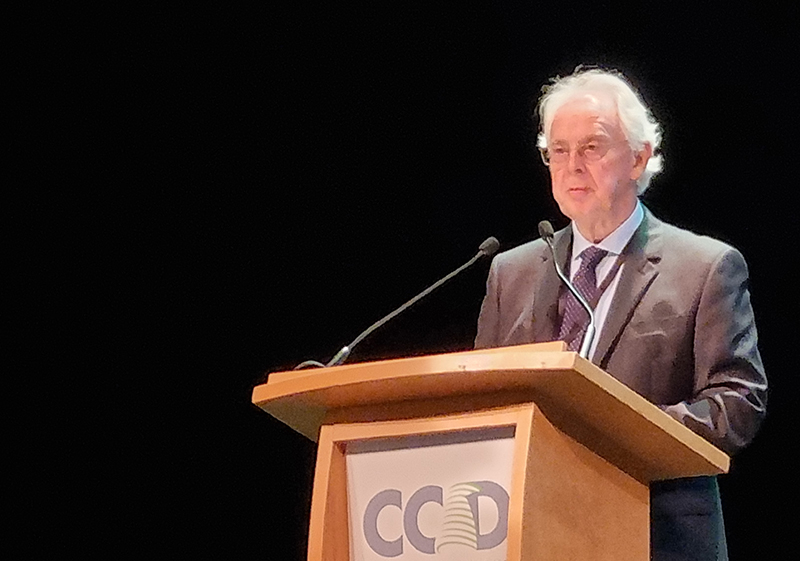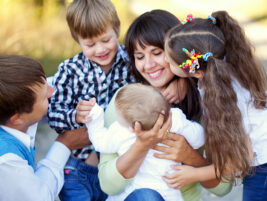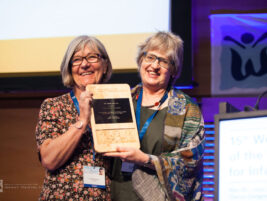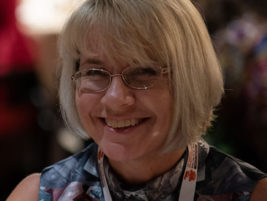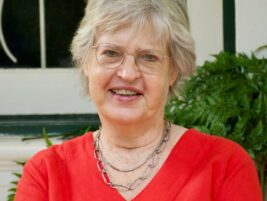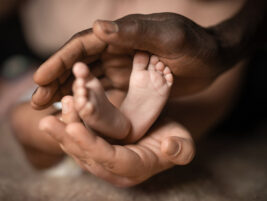The 18th WAIMH Congress Dublin 2023 Presidential Symposium was titled: Advocating for infants in a complex world with competing priorities: ensuring that the infant’s voice is heard and honoured. The key speakers were Prof Campbell Paul, WAIMH President, Naarm, University of Melbourne and Prof Cath Chamberlain, Naarm, The University of Melbourne. Prof Astrid Berg, WAIMH President-Elect, University of Cape Town and Stellenbosch University, was the Discussant.
The reflection below relates to the presentations by Campbell Paul and Cath Chamberlain. Following these two presentations, the allotted time for the symposium was complete. Astrid generously offered to share her presentation with delegates and the wider WAIMH community in Perspectives. Astrid’s discussant paper for this symposium immediately follows this reflection.
It is a challenge to convey the material shared in this symposium as it was received via my in-the-moment experiences during the symposium. There was a continuous vibrant shared ambiance at the Congress. In conjunction, there were many speakers who were sharing salient narratives. Collectively, this was met by a quiet active exchange within my internal landscape; akin to an experience of navigating “the now moment and the moment of meeting” (Stern, 2004, xviii). The best way I can capture this symposium is via the metaphor of journey; journey across time, past, present, staying connected with the pitstops along the way; the joyous and painful pitstops all worthy, treasured, re-membered, on the collective way forward.
At the outset, the symposium began with a presentation by Campbell Paul, WAIMH President. Campbell took us all on a journey, passing through many key tenets gifted to us by some of the foundational researchers and clinicians in the field of infant mental health.
For example, Winnicott and playfulness and mirroring, Bob Emde and the moral self of infancy, Trevarthen on the primary intersubjective capacities of babies, play and shared discovery, Reddy on how babies know minds and intentional play, Mireault and Reddy on playfulness and clowning with babies, Nagy and colleagues on neonatal imitation capacities, The Boston Change Process Study Group on intersubjectivity and moments of meeting, and Ann Morgan promoting babies as equal partners in the interaction. Each tenet, one by one, reflected a portal to facilitate seeing the baby as an active participant, in day-to-day family life and in therapy.
Within the context of this rich tapestry of practice science and wisdom, Campbell invited us to journey with him, re-minding us all that the baby, too often remains out of sight and mind as a participant, and, that we can also be out of sight to the baby. He invited us to grapple with an uncomfortable consideration: To fathom how we cannot not see the baby as a primary participant in all interactions, problem-solving and shared decision-making. And to fathom, how we can unintentionally be out of the sight of the baby.
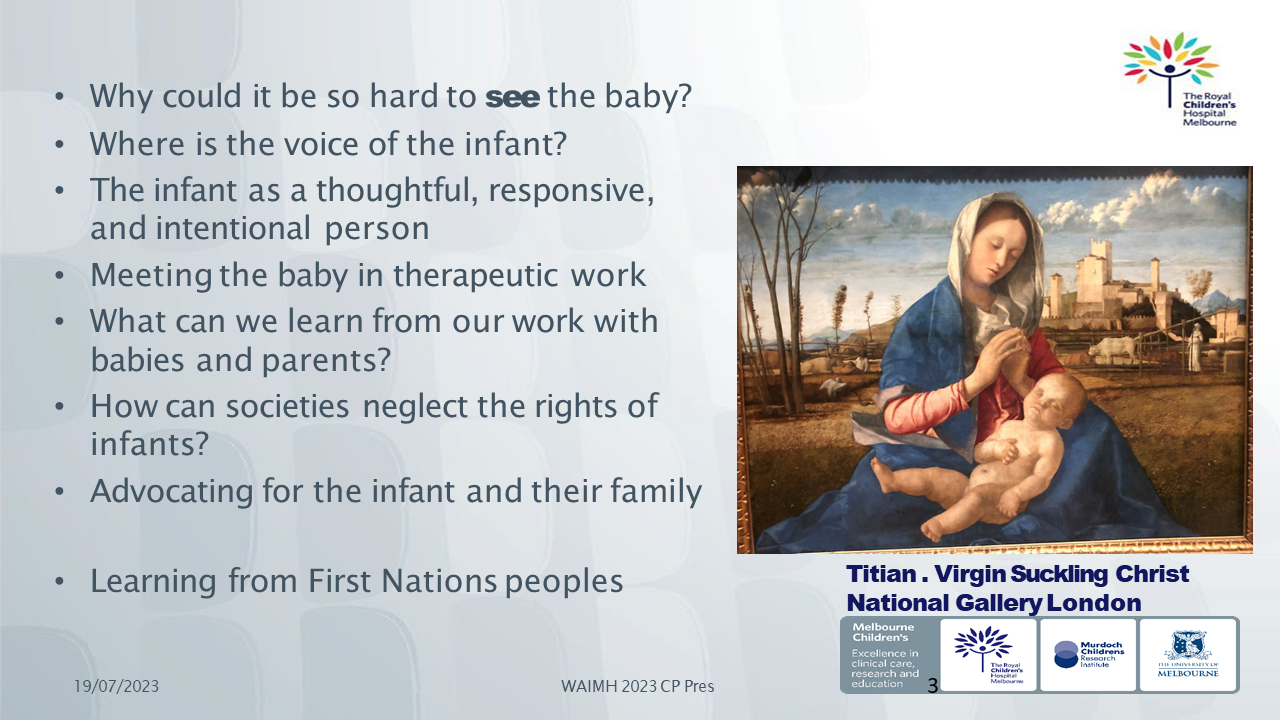
Campbell asked us, “Why could it be so hard to see the baby”. In conjunction, he reflected when the baby looks at us, they need to see themselves there, present. He said, “We need to make sure we are not an empty mirror” (Campbell Paul, WAIMH Congress Dublin, 2023). In conjunction, these practice principles, at best, create the conditions within which the baby, when they are readying and needing to see and communicate with us, is able to find us. That is, to find us there in a timely way and experience themselves in relationships that support growth, development, and shared happiness in relationships.
To bridge theory with practice wisdom, Campbell shared vignettes of babies as recipients and contributors to intergenerational healing in moment-to-moment interactions with their caregivers and families. He showed how “baby Jessica becomes the therapist for the mother” (Campbell Paul, WAIMH Congress Dublin, 2023). Campbell showed how baby Jessica was not in a role reversal here where she was burdened. Her therapeutic offerings to her mother arose out of her being in her developmental skin in moments of shared attention and joy with her mother, within which her mother experienced this as a moment of belonging; her to baby Jessica and baby Jessica to her.
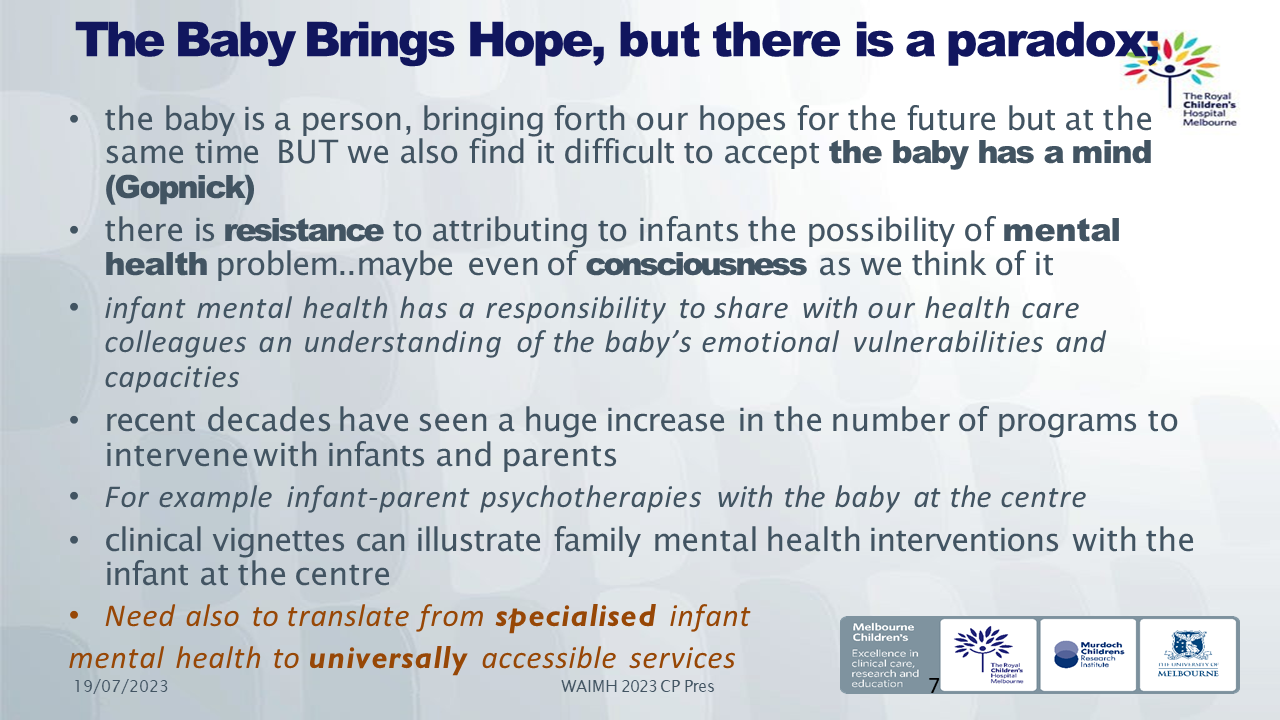
Similarly, in the therapeutic setting, Campbell showed babies as both recipients and contributors to the therapeutic alliance. These babies with their parents, and the therapist, illustrated the lived experience of “moments of meeting”. Moments of meeting, is a construct that captures an intersubjective shared experience of knowing each other (see the work of The Boston Change Process Study Group and Daniel Stern (2004) in his book, The present moment in psychotherapy and everyday life).
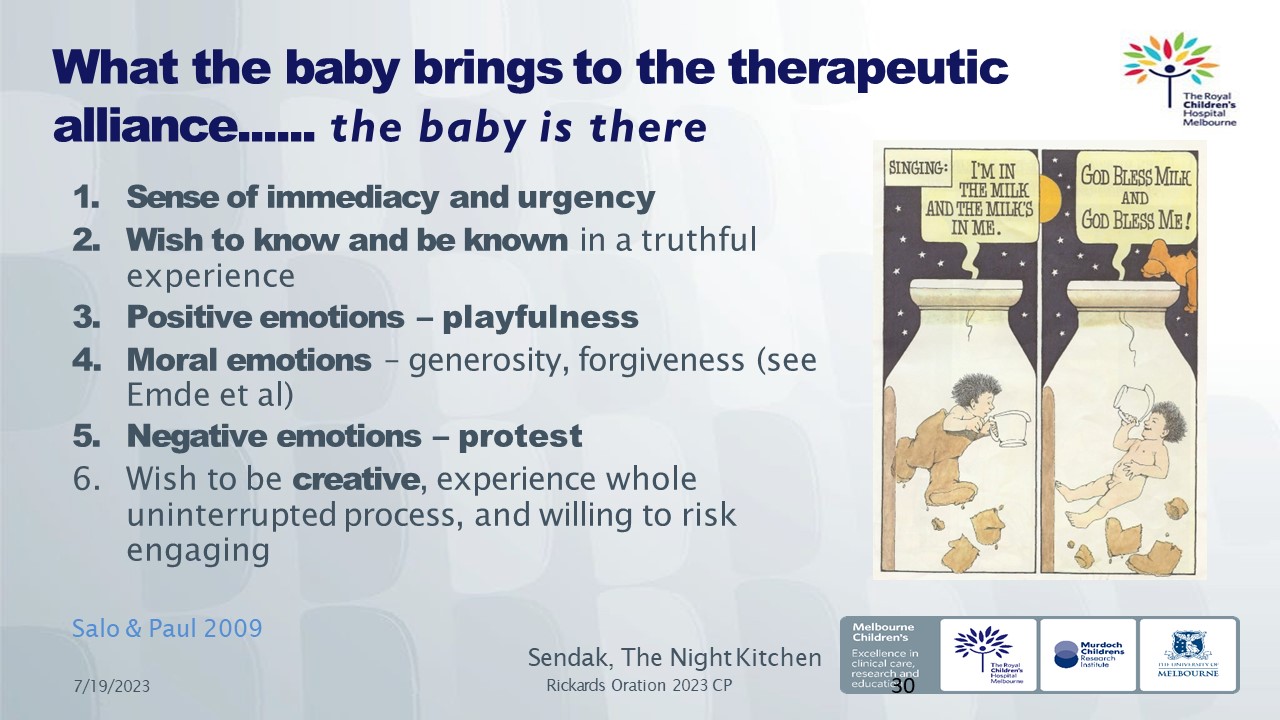
Campbell reminded us of the work of Serge Lebovici, in Paris, where the therapist at best, develops the capacity to deeply listen and understand the intentions hopes and fears of both the baby and the parents. Furthermore, this was exemplified in the relationship-building function of the NBO (Newborn Behavioral Observations) (Nugent and colleagues).
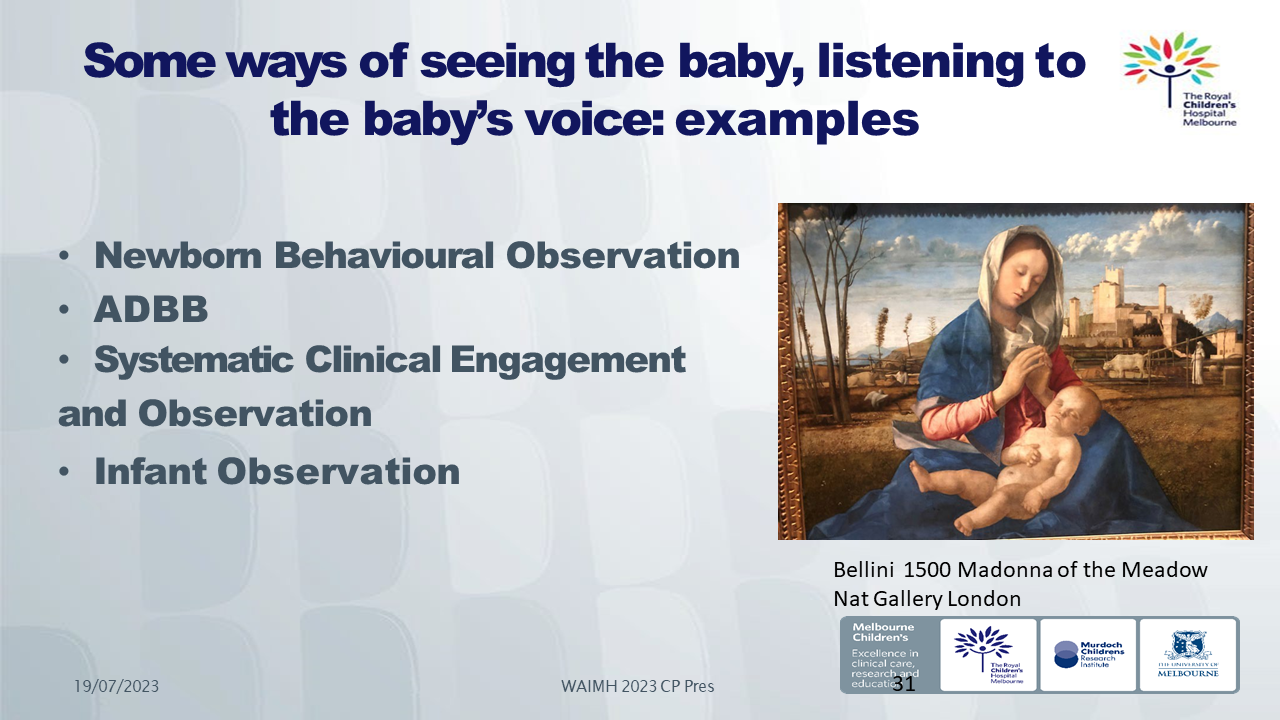
Following Campbell’s presentation on bringing the baby into view and conversation within the therapeutic alliance, Professor Catherine Chamberlain continued this theme in conjunction with that of the Pre-Congress Institute: Embracing diversity-informed practice in infant mental health. This pre-congress featured community-based and diversity-informed infant mental health expertise across regions.
Professor Catherine Chamberlain is a Palawa woman of the Trawlwoolway clan (Tasmania), a registered midwife and public health researcher. She is currently a professor of Indigenous Health and NHMRC Career Development Fellow at the Centre for Health Equity, and Director of Onemda Aboriginal and Torres Strait Islander Health and Wellbeing, Melbourne School of Population and Global Health, The University of Melbourne. She also holds the position of Editor-in-Chief of the First Nations Health and Wellbeing: The Lowitja Journal.
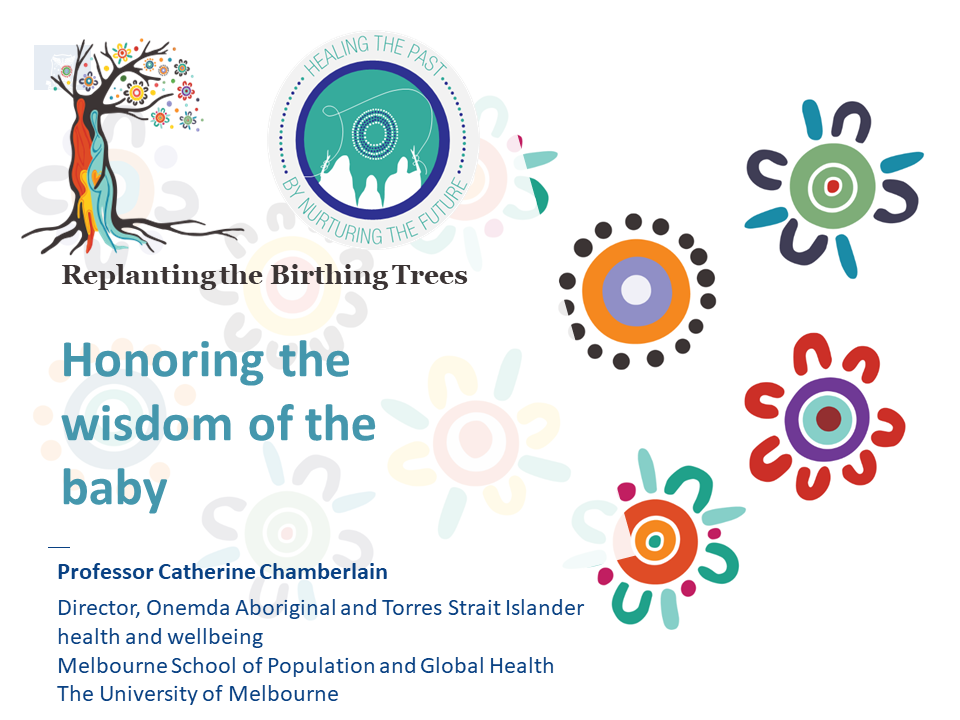
In her presentation, “Honoring the wisdom of the baby: replanting the birthing tree”, she shared with us, the work of her and her team, as experts in First Knowledges concerning Aboriginal and Torres Strait Islanders, intergenerational trauma and intergenerational nurturing and recovery.
She began her presentation by stating that, “infant mental health is a public health issue for Aboriginal and Torres Islanders in Australia”. In response to this, Cath and her team are actively engaged in addressing this public health issue, one family at a time, across generations. This work is anchored in creating healing perinatal experiences and opportunities for parents experiencing complex trauma to address and improve health equity among Aboriginal and Torres Strait Islanders.
To this end, Cath shared the work of her and her team on two inter-related multi-disciplinary projects:
- Healing the Past by Nurturing the Future – with a focus on the perinatal period, and
- Replanting the Birthing Trees. A project which “aims to transform cycles of intergenerational trauma to intergenerational cycles of nurturing and recovery”.
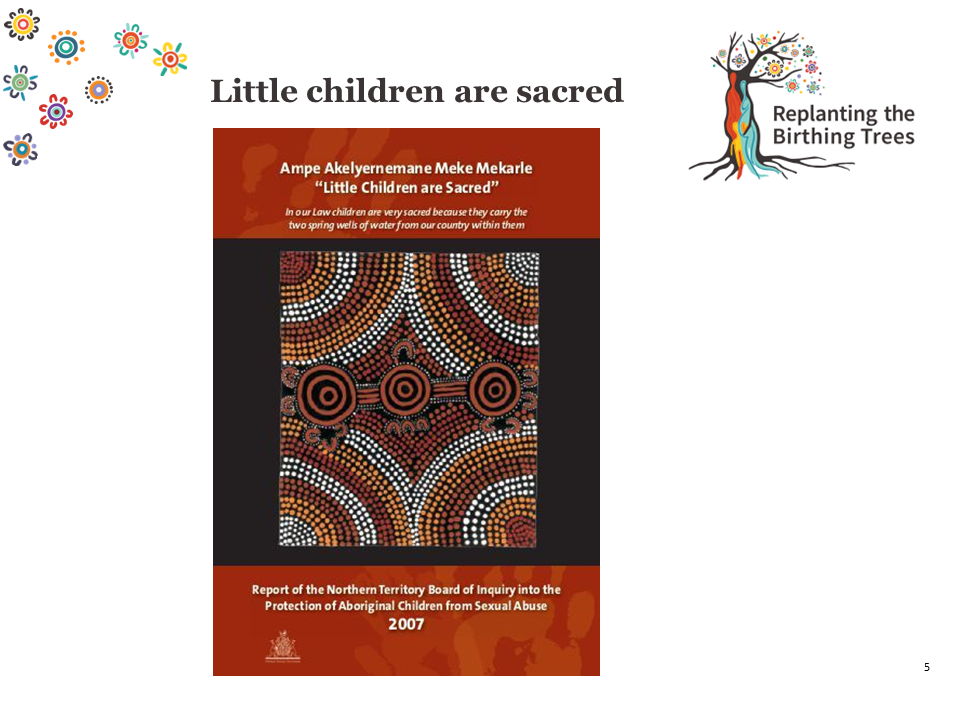
Underpinning these two projects is an ongoing process of elevating and reclaiming first knowledges by reclaiming ancestral wisdom as knowledge, knowledge to guide the healing, nurturing and recovery process. This is momentous, in the face of the effects of abusive, isolating and dis-membering colonization. For Cath and her team, this knowledge and wisdom is revealed in the birthing on country (Marriott & Chamberlain, 2019).
First knowledge birthing ancestral wisdom includes:
- Everyone in the system interacting with the baby was accountable to someone.
- There is no word for disability.
- There have always been more than two genders.
Furthermore, Cath underlined the expert foundational stones of inter-generational knowing such as:
- The state of well-being is valued and continued over time through inter-generational ancestral relationality values.
- Cultural practices help to connect the past, present and future.
- Tarama is a disruption to our connection.
This knowledge and wisdom are manifested in sacred birthing practices that foster connection by aligning with all of the babies senses. This includes being sung into birth, being placed at birth onto warm ashes, being presented with a person and their unique sound in an ordered way, and being introduced to special tastes, smells and animal totems.
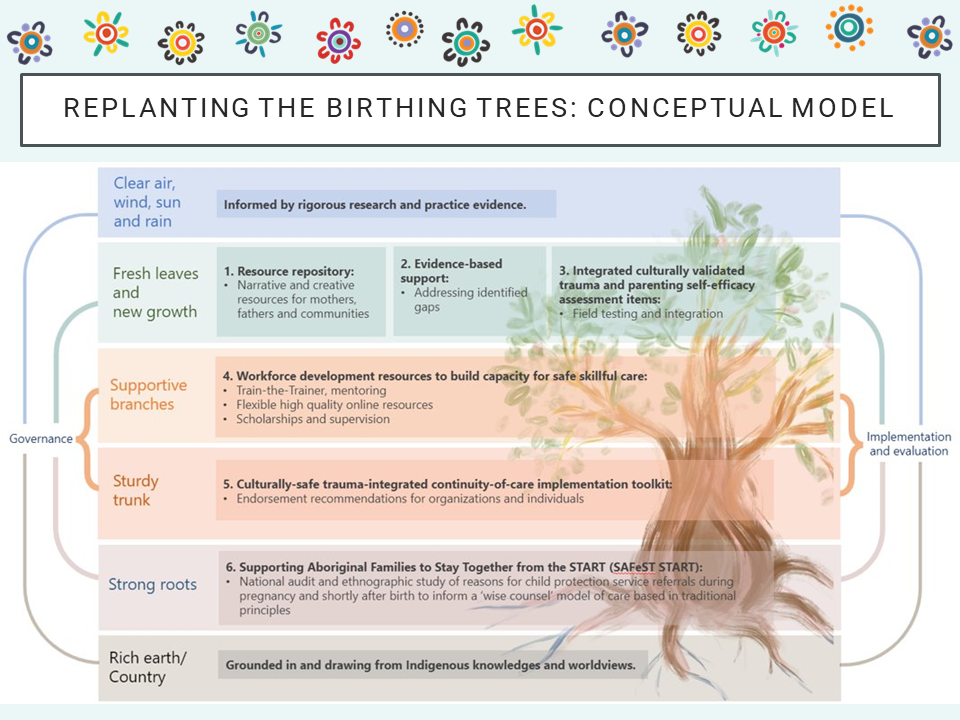
Reclaiming this knowledge and expertise is essential to making inroads into new public health outcomes. Cath talked about the social determinants of health and the compounding effects of intergenerational and complex trauma on health equities (Marmot et al., 2012). Public health inequity is rooted in intergenerational colonization and violence, and systemic racism, leading to toxic stress, complex trauma and intergenerational trauma. This is evidenced in the stolen generations of children who were intentionally removed from their families, communities, and identity of belonging. Across generations, these Aboriginal and Torres Strait Islander children were and remain over-represented in care and protection services and death statistics caused by suicide.
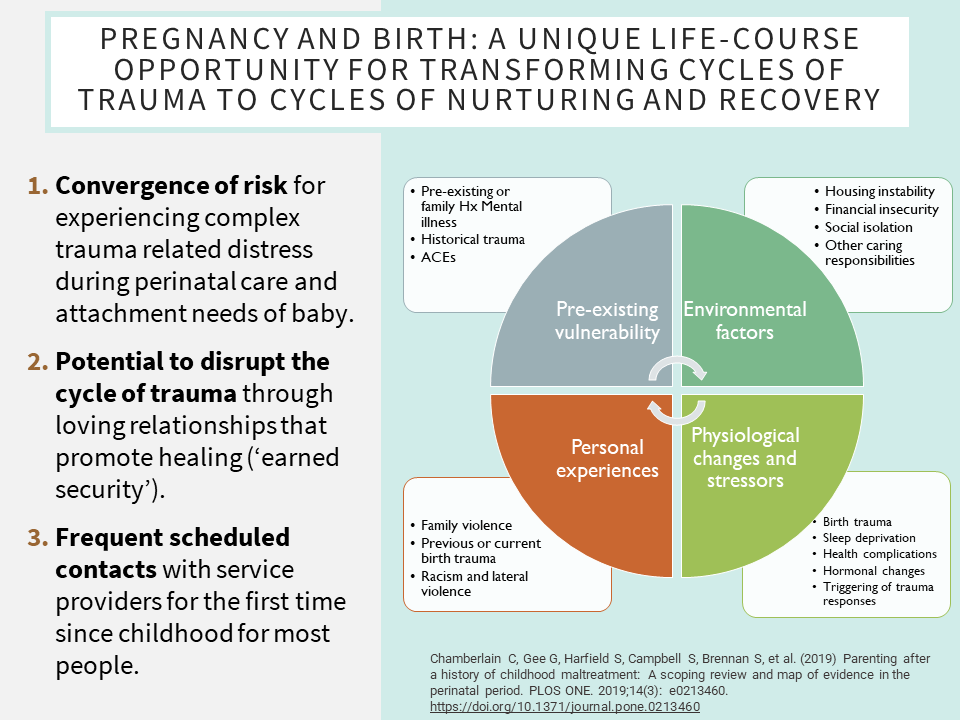
Compacted Trauma (Aunty Debra Bennet, Lead Aboriginal and Torres Strait Islander Engagement and Cultural Advisor, Australia).
As an extension of the construct of complex trauma, Cath spoke of “Compacted Trauma”, a term developed by Aunty Debra Bennet, to capture the experience of and the intergenerational impact of the extreme trauma that is layered over already complex trauma. Dr Chamberlian, described this further as follows:
‘Compacted trauma’ is a term used by Aunty Debra Bennet in Australia to describe the effect when, someone who is already experiencing complex trauma associated with ‘interpersonal threats that they can’t escape’, has a baby removed shortly after birth by the state. Babies can be removed without the mother being told this is planned, Aboriginal staff are sometimes asked not to tell parents this is planned. It is such an intimate time and there is no escape from the state – a complete sense of powerlessness. We don’t know what to call this extreme trauma, but Aunty Deb Bennett describes it as ‘compacted’ trauma.
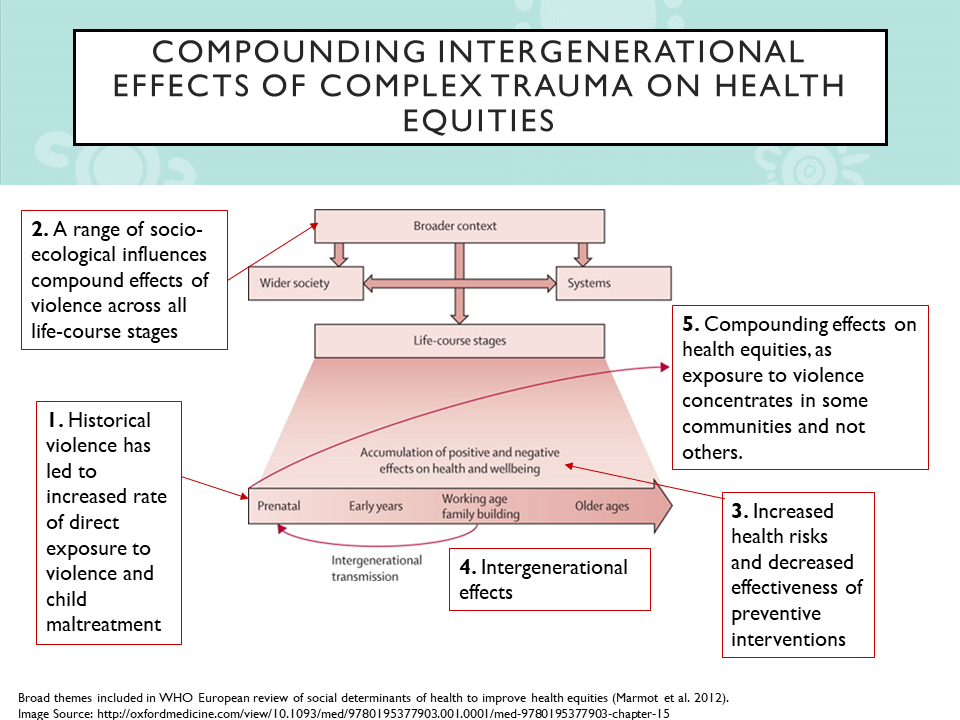
Dadirri, Story Telling, Yarning: Cath also presented the practice of Dadirri (deep listening), story-telling or yarning as a collaborative practice in the perinatal and birthing space. In addition, Geia et al. (2013) also highlight yarning as a research method that facilitates collaborative research that benefits its participants and contributes to bridging the gap in health outcomes between the Aboriginal and Torres Strait Islanders and mainstream Australia.
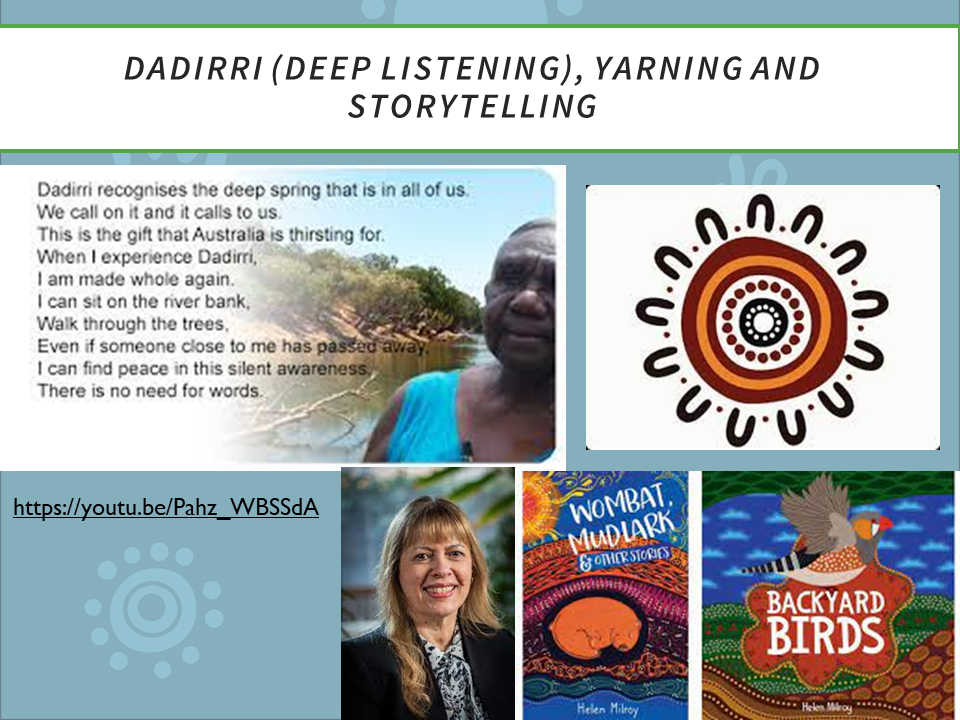
Cath finished her presentation with “The Uluru Statement from the Heart”. This statement is an invitation to the Australian people to walk with Aboriginal and Torres Strait Islanders to grow a better future for all. This invitation, from those who have suffered so much as a consequence of colonization, speaks also to a wider invitation for all members of WAIMH to walk in partnership with first knowledges and western knowledge concerning the antenatal and perinatal periods with infants and their families.
Cath eloquently invited us to hold the baby in view with local intergenerational expertise, standing equal, with integrative ambidexterity, alongside knowledge and expertise that we typically privilege within the field of infant mental health. She expertly invited us to also grow our capacities for professional integrative ambidexterity, growing towards increasingly inclusive perinatal and birthing knowledges.
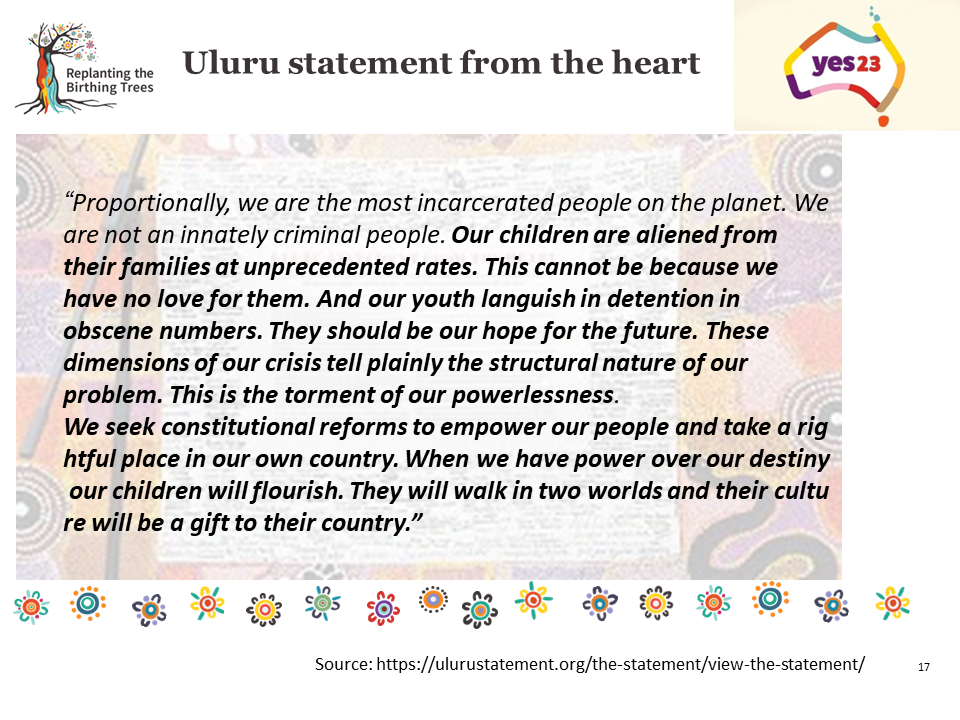
Further information
Email: hpnf-project@UNIMELB.EDU.AU
Website: Onemda: Aboriginal and Torres Strait Islander Health and Wellbeing (unimelb.edu.au)
Online training: Healing the Past by Nurturing the Future – Emerging Minds
For further reference see
Growing up Yolngu website: Growing up Yolngu
Atkinson, J. (2002). Trauma Trails recreating songlines, The Transgenerational Effects of Trauma in Indigenous Australia. Spinifex Press.
Chamberlain, Catherine, Gee, Graham, Harfield, Stephen, Campbell, Sandra, Brennan, Sue, Clark, Yvonne, Mensah, Fiona, Arabena, Kerry, Herrman, Helen, and Brown, Stephanie (2019) Parenting after a history of childhood maltreatment: a scoping review and map of evidence in the perinatal period. PLoS ONE, 14 (3). e0213460.
Chamberlain, C., Clark, Y., Hokke, S., Hampton, A., Atkinson, C., Andrews, S., & HPNF investigator group (2021). Healing the Past by Nurturing the Future: Aboriginal parents’ views of what helps support recovery from complex trauma. Primary health care research & development, 22, e47. https://doi.org/10.1017/S1463423621000463.
Davies, R. (2021) Helen Milroy: pioneer in Indigenous and child mental health, The Lancet, Published:November 20, 2021DOI:https://doi.org/10.1016/S0140-6736(21)02483-1
Geia, L. K., Hayes, B., & Usher, K. (2013). Yarning/Aboriginal storytelling: towards an understanding of an Indigenous perspective and its implications for research practice. Contemporary nurse, 46(1), 13–17. https://doi.org/10.5172/conu.2013.46.1.13
Marmot, M., Allen, J., Bell, R., Bloomer, E., Goldblatt, P., & Consortium for the European Review of Social Determinants of Health and the Health Divide (2012). WHO European review of social determinants of health and the health divide. Lancet (London, England), 380(9846), 1011–1029. https://doi.org/10.1016/S0140-6736(12)61228-8
Marriott, R., & Chamberlain, C. (2019). Change is in the air: Reclaiming ancestral wisdom through Birthing on Country in Australia. Women and birth: journal of the Australian College of Midwives, 32(5), 381–382. https://doi.org/10.1016/j.wombi.2019.07.005
Authors
Maree Foley,
WAIMH Perspectives IMH Editor-in-Chief,
Switzerland


